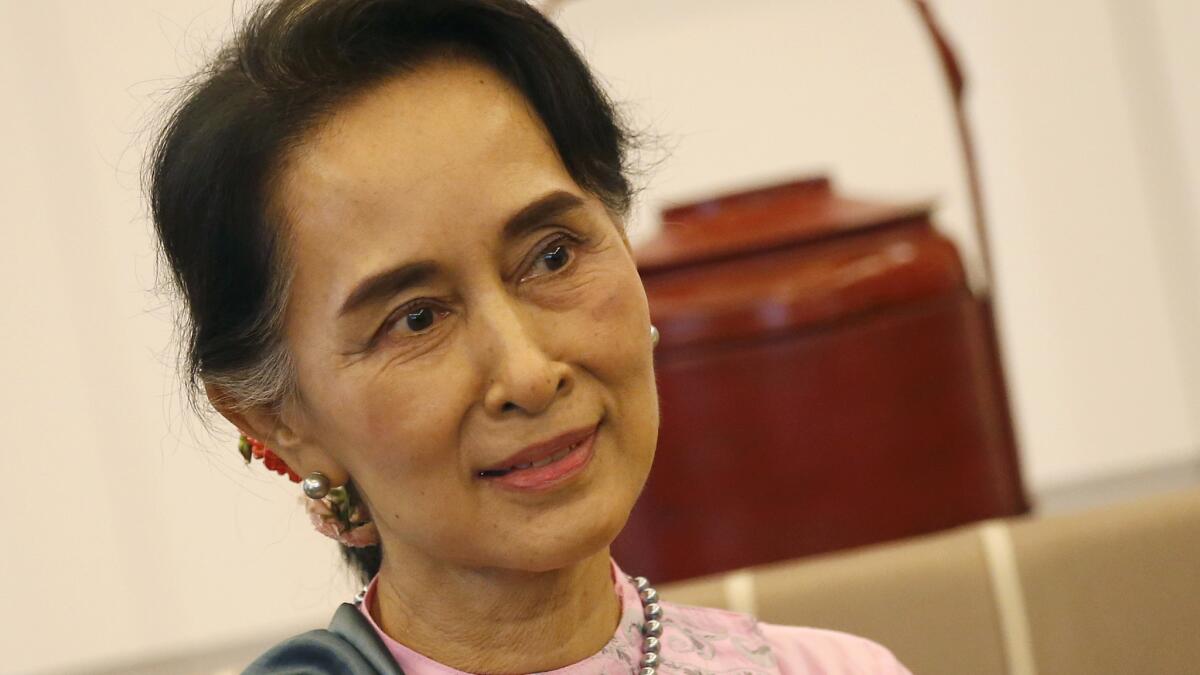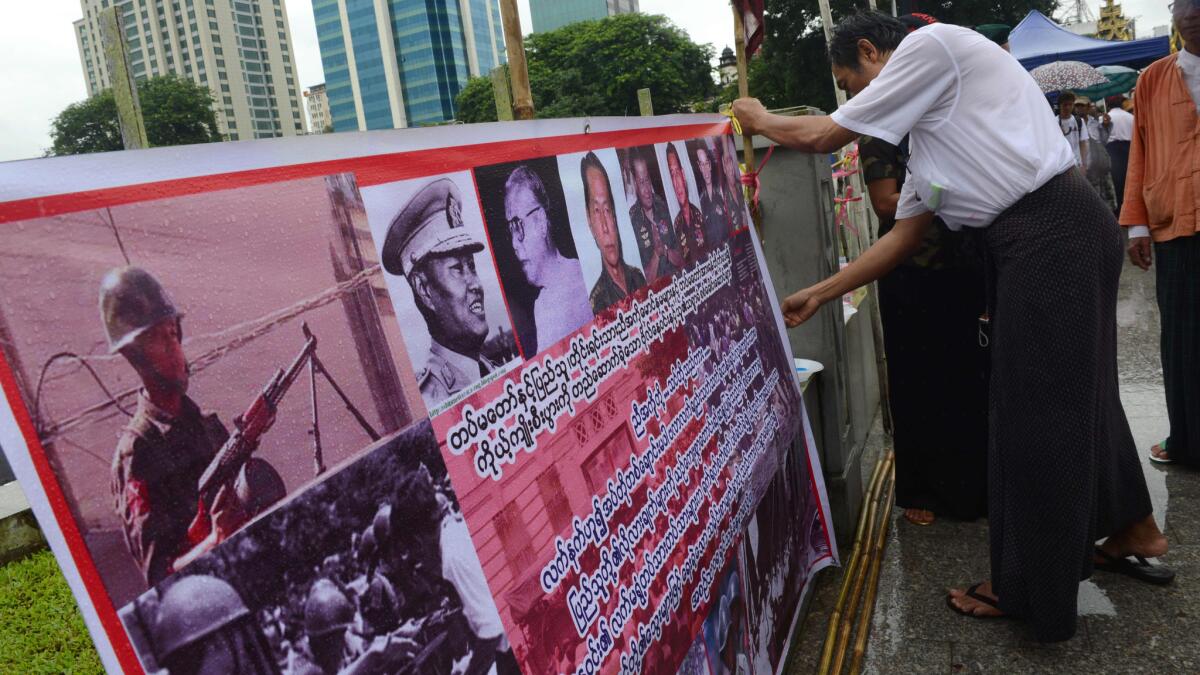Q&A: A pariah no more, Myanmar is open for business — and corporate America is already in line
- Share via
When Myanmar elected its first civilian-led government in more than 50 years last November, allowing former political prisoner and Nobel Peace Prize winner Aung San Suu Kyi to become the country’s de facto leader, it cleared the way for this onetime pariah nation to normalize relations with many Western countries.
The United States has restored full diplomatic relations with the Southeast Asian country, also called Burma. In May, the White House eased some to its toughest sanctions against the nation, such as lifting the boycott of state-owned banks and offering support to help quicken reform in the country’s political, economic and social sectors.
Many challenges remain in Myanmar, including halting government-sanctioned discrimination against ethnic Rohingya Muslims, stamping out corruption and improving relations with armed ethnic minorities who control portions of the country.
But U.S. officials believe that Myanmar is on the right track.
“When we eased 80% of our sanctions, and when Burma elected Aung San Suu Kyi, it literally ushered in a new era of opportunity,” Assistant Secretary of State for Economic and Business Affairs Charles Rivkin said in an interview with The Times this month, shortly before leading U.S. business leaders on a trade delegation to Myanmar.
Here are excerpts from that interview, which have been edited for length and clarity.
How open is Burma to business?
When you think about Burma … it is bordering China and India, meaning it’s bordering 2.5 billion people. It is said that Burma, because of its location, its geography, is going to be, by 2025, within 5 hours of half of the world’s consumers. So it is at a very interesting point in time. It’s a $63-billion economy, but it really could be the crossroads between Southeast Asia and South Asia. And so is it open for investment? The answer is yes.
It’s not just the fact that U.S. exports have tripled to Burma between 2011 and 2014 and there’s huge demand for U.S. goods. In my opinion, they’re open to investment, but they’re particularly open--at least we’ve heard from their government--to American investment. The American brand when it invests is …pretty unique in that we invest in communities. We invest for the long term. We hire local employees. We partner with communities.
Microsoft just did a deal with Myanmar Computer, where Microsoft is going to be training 100,000 people in Burma for IT skills. Coca-Cola just put in $200 million, which we’re told is going to result in 22,000 jobs for people in Burma by 2018. And the Coca-Cola Foundation has partnered with something called Pact, which is [a nongovernmental organization], to empower 25,000 women focusing on women and entrepreneurship and business management.

How does the military’s continued influence affect U.S. investments?
Challenges still exist. The military has 25% of the seats in parliament. They have control over key ministers and parts of the economy. We’ve eased 80% of our sanctions. There are still 20% that remain.
The vast majority of those sanctions are about people, specific individuals who undermine the reform process. But at the same time we want to have sanctions promote broad and inclusive economic development. We don’t want to get in the way of that.
Does that mean that there’s still a pocket of money off limits to U.S. investors?
The sanctions target key individuals. But something quite interesting happened this May where President Obama announced a number of steps about how he would support the new democratic government, involving sanctions. He eased all the remaining sanctions so that U.S. banks can get involved with any financial institution in Burma. Secondly, he changed the investment cap reporting threshold from $500,000 to $5 million. That’s also very important because it (had) discouraged American investment, because you’d have to get caught up in a lot of reporting requirements.
Finally, he took the state-owned enterprises that report to the civilian government off the (sanctions) list. The ones that report to the military are still largely there. What the president has done is that he has opened the door for American investment.

What is the aim of the delegation you’re leading to Burma?
Secretary of State John Kerry has asked us to engage in something that he has created called the Innovation Roadshow. It highlights American entrepreneurship and innovation and encourages governments to adopt regulatory rules that attract investors and create jobs. It also strengthens the bilateral business ties between American and the other nations’ business leaders.
Largely what we’re sharing with them is something that America does very well, which is innovation and entrepreneurship. It is the spark of any economy.
(The U.S. business leaders who traveled to Myanmar with Rivkin included representatives of IBM, Chevrolet, General Motors, Coca-Cola, Omidyar Network, Deloitte & Touche, and the Massachusetts Institute of Technology.)
What still needs to happen in order for American companies to invest?
The U.S. business leaders all are interested in further investment. They believe this has enormous opportunity. But obstacles still exist inside the country. For example, the infrastructure in many ways is outdated and poorly maintained. I would argue that the infrastructure concerns are also opportunities for investors. For example, 30% of Burma doesn’t have access to electricity. They’ve already done a lot in terms of tax policy, investment policy. They’ve already tried to reform laws, but there are still a bunch of laws that are outdated, that need to be reformed.
What American investors need are three basic concepts — transparency, predictability and the rule of law. The more that we can work with our friends and allies in these countries when we do our roadshows to help explain the American system and maybe help them create a regulatory environment that would help promote investment, the better.
Is it realistic to think that the easing of sanctions is going to lead to reforms that would allow for greater U.S. investment?
The easing of the 80% of the sanctions has already ushered in a lot of American investment and will continue to do so. America [represents] only about 1% of the total foreign direct investment. That also is an opportunity because the investment has always been in the past about natural resources, and now there’s a chance for manufacturing and services investments.
If you look at the history of Burma … it once was the largest exporter of rice in the world. The agricultural economy has enormous opportunity, but now obviously there are other natural resources, like wood, oil, etc. With the development of their economy, manufacturing and services investment could be enormous as well.
The private sector is pushing for more normalization to give more tangible benefits to the people of Burma. I think this is a real moment in time.
For more on global development news follow me @AMSimmons1 on Twitter
MORE WORLD NEWS
U.N. admits a role in deadly Haiti cholera epidemic
Russian use of Iranian air base shows Moscow’s renewed military might
Grainy footage appears to capture kidnapping of son of Mexican cartel leader ‘El Chapo’
More to Read
Sign up for Essential California
The most important California stories and recommendations in your inbox every morning.
You may occasionally receive promotional content from the Los Angeles Times.














